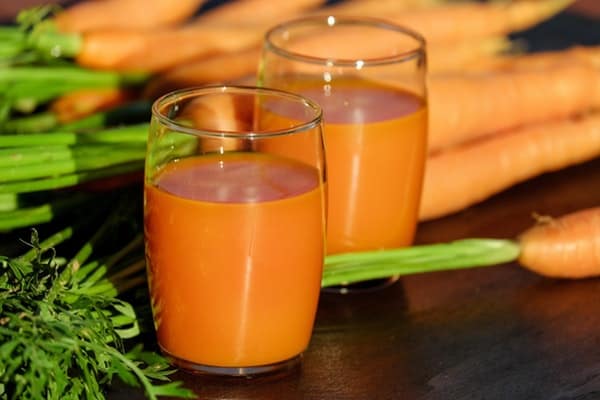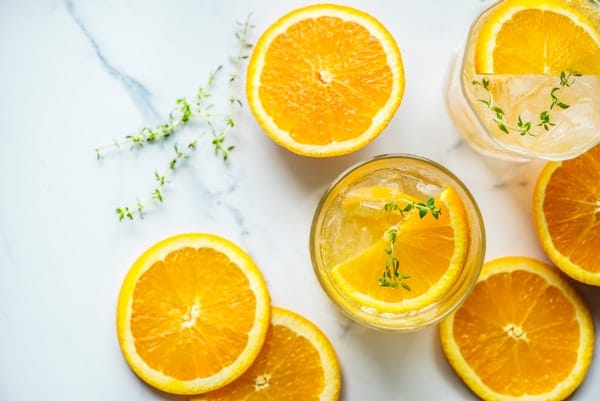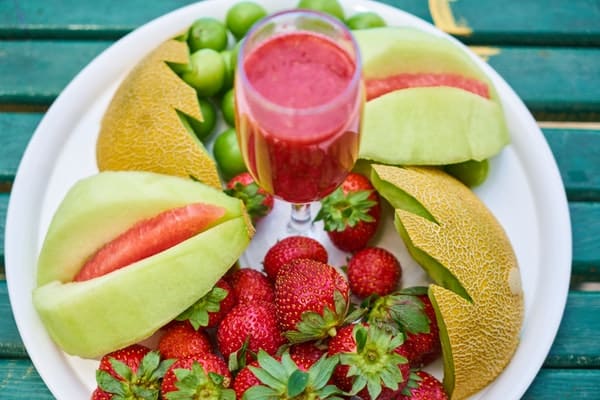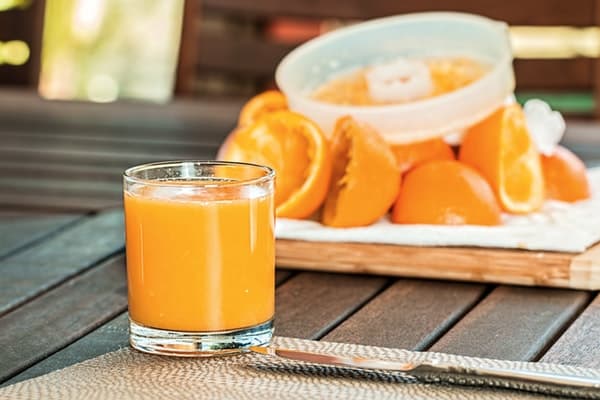Table of Contents
How long does homemade juice last in the fridge? If you’re seeking an answer to this question, you’ve come to the right place. Our staff is well versed in everything related to juice, smoothies, and more!
*This post may contain affiliate links. As an Amazon Associate we earn from qualifying purchases.
How Long Does Homemade Juice Last in the Fridge?

Image via Pexels
The question of how long does homemade juice last in the fridge is a relatively simple one to answer.Homemade juice lacks the preservatives that store-bought products contain, so it will typically expire within 24 to 72 hours depending on several factors. Presumably, your goal is to make it last 72 hours.Unfortunately, the preservatives companies use are not available for the public to purchase. Although, avoiding chemicals is one reason for making homemade juice in the first place.You shouldn’t become sick after drinking homemade juice that’s been in the fridge for three to four days. However, it may have lost its most nutritional value and will likely smell and taste “funny.”The longer you wait after making homemade juice before drinking it, the higher the risk you run of getting food poisoning.To protect the nutritional value of your homemade juice and allow for the greatest possible shelf life, it’s essential to understand what causes the juice to turn.
How Long Does Homemade Juice Last in the Fridge: Oxidation

Photo by rawpixel.com from Pexels
Through a process known as oxidation, oxygen causes fruit and vegetables to change color and taste bad. For example, if you’ve ever made a sandwich with half an avocado on it, you’ve probably been frustrated by how quickly the other half spoils.From the moment the fruit’s innards are exposed to the air, they begin oxidizing. All you can hope for is to slow the process down.When storing cut fruit, this is as simple as placing it in an airlock container or resealable plastic bag. The less air that the fruit is exposed to, the longer it’s likely to last.However, homemade juice is more difficult because the cell walls have been broken, leaving it more exposed. Additionally, the process of juicing can push oxygen into the juice.Exposure to heat and light also cause your homemade juice to expire more quickly. While heat allows bacteria to grow, light promotes oxidation.Therefore, the question of how long does homemade juice last in the fridge depends on limiting its contact with heat, light, and oxygen as much as possible. With enough planning and effort, you may even be able to push the expiration date passed 72 hours.
How Long Does Homemade Juice Last in the Fridge: Make the Most of It
Although your homemade juice will never last as long as store-bought products, you can take steps to ensure they last long enough.
Use the right juicer
All juicers are not created equally, but all types have their pros and cons.
Centrifugal juicers
[amazon box=”B07LBKK6Y8″]
Centrifugal juicers use blades that move at speeds of around 1,000 rotations per minute. They are the most popular kind of juicer for multiple reasons.For one, they’re cheaper than other types of juicers. Who doesn’t love cheap?They’re also the fastest at producing juice and are easy to clean. You don’t even have to chop up your fruits and vegetables before throwing them in the juicer.So if you’re looking for a quick cup of juice before heading out to work, this type of juicer is perfect for you.Unfortunately, their high RPM literally pulls oxygen into your juice and mixes it in.For this reason, your juice will not last nearly as long if you make it with other types of juicers. Therefore it’s wise to use centrifugal juicers only when you plan on drinking them right away.Another downside to centrifugal juicers is they do not handle leafy greens such as spinach well.
Masticating juicers (cold press)
[amazon box=”B07DCKYJ5D”]
Masticating juicers work by crushing fruit and veggies against a screen to slowly press the juice out of them.Because the rotating auger that crushes them only moves at around 100 RPM, the amount of oxygen entering your juice is much less significant.These juices also handle delicate vegetables with more elegance, ensuring that their nutrients aren’t lost.The downside to masticating juicers is they take longer and have more parts to clean. You’ll also need to spend time prepping your produce before pressing it.We recommend using these when you have time to create a batch of juice to last you the next couple days.
Twin gear juicers (cold press)
[amazon box=”B002QGXTJK”]
Rather than using one auger and a screen, twin gear juicers press produce between two augers.Like masticating juicers, they add as little oxidation to your juice as possible. As a bonus, twin gear juicers are slightly faster and their juice is of the highest quality.Unfortunately, they are more expensive and difficult to clean. If this doesn’t deter you, however, they are a nice balance between centrifugal and masticating juicers.
Store your juice in the right containers
The question of how long does homemade juice last in the fridge is also affected by the container you store it in.Some people say that plastic will cause your juice to oxidize faster, although we’ve been unable to find solid evidence supporting this claim.Regardless, cheap plastic especially can leach into your juice, affecting the taste and causing potential long term health risks.For that reason, we highly recommend glass containers above all others. For a more portable option that is less likely to break, go with thick plastic water bottles.When choosing a container you will, of course, want one with an airtight lid. It should go without saying that the tighter the lid, the less oxidation will take place.Another important variable to consider is the size of the container. It is more effective to store your homemade juice in single-portion bottles than it is in a large gallon jug, for example.The less you open and reseal the container the better. Therefore, it’s best if the bottle is small enough for you to drink all of the juice inside it in one go.Possibly the best containers for maximum shelf life are mason jars. As a bonus, they are very easy to clean because of their large girth. Use a vacuum sealer to remove all air from the jar.
Select the right produce

Photo by Engin Akyurt from Pexels
Produce that is closer to expiring will naturally expire faster as a juice. In addition, produce reaching the end of its life will have fewer nutrients.High-quality organic produce lasts longer. The nutrients take more time to break down because there are more nutrients to begin with. Healthier fruit also tends to live longer.For example, you may think all carrots are the same. But the nutrients they contain have a lot to do with the soil they were grown in, such as what minerals the farmers added.The best way to ensure you’re getting the freshest, highest-quality produce is by growing them in your own garden. If you grow your own fruits and vegetables, you can juice them immediately after harvesting and they’ll have had no time to lose nutrients whatsoever.Alternatively, you can visit farmers markets and ask how the food is grown, what minerals they added to the soil and so forth.
Additional tricks
There are a few other small things that affect the question of how long does homemade juice last in the fridge.First, the temperature of the fridge plays a role. This may seem obvious, but you can turn the temperature in your fridge down to just above freezing for maximum results.Processes such as oxidation and bacteria growth work slower in colder in environments. However, any colder and your juice could freeze and destroy the container it’s in.Air does not circulate well in a crowded fridge, so storing your homemade juice on its own shelf or in a special fridge is ideal.Finally, adding some acidity such as lemon juice will slightly slow down the oxidation process. This works great for whole cut fruit but is less effective in juice.
Juice as you go
If you follow all of our advice, your homemade juice should last around 72 hours at least.While that might not sound like a lot, it’s plenty of time for you, a family member, or a roommate to drink whatever you make.Decide how much juice you’ll go through in a 72-hour time span and make a batch all at once.Or have a couple of premade juices on reserve from your cold press machine, while drinking mainly juice from your centrifugal juicer.
Ready to Juice!?

Image via Pexels
Now that you’ve answered the question of how long does homemade juice last in the fridge, are you excited? There’s a whole wide world of fruits and veggies out there, and juicing recipes for all of them.Which are your favorite juicing ingredients? Do you prefer the quickness and convenience of a centrifugal juicer or the quality and shelf life of a cold press? Any tips for making homemade juice last longer?Tell us all about it in the comments below!
Featured Image: Photo by Artem Beliaikin from Pexels

